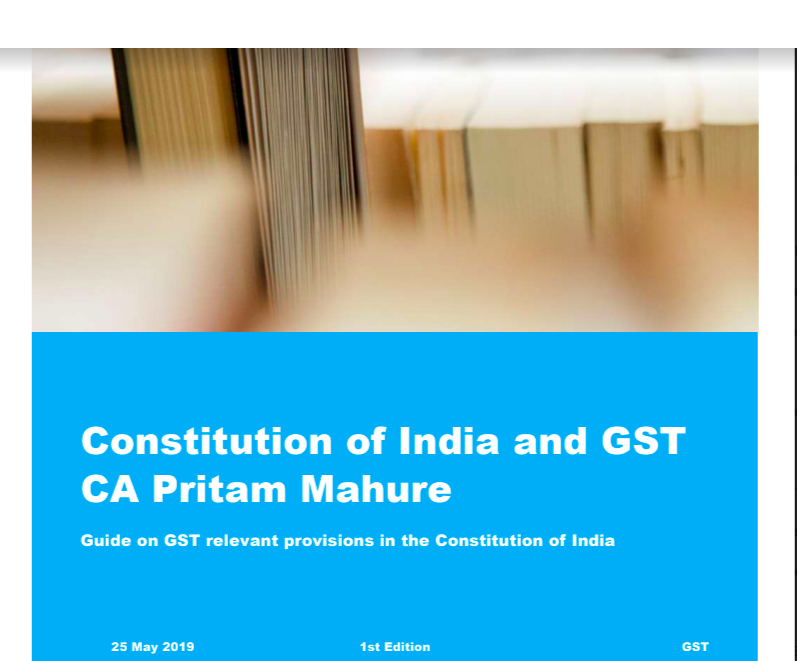Free E- book on GST including constitution
Introduction:
This E-book is a unique combination covering GST right from the provisions of the constitution. Rules of interpretation of the constitution of India is covered. The E-book on GST is covering the following topics:
Its less than two years since its introduction of GST but, thanks to hundreds of Notifications, Circulars, FAQs, Flyers along with writs, case laws and advance rulings, it literally feels like two decades! Aforesaid numerous changes itself have brought a layer of uncertainty about even the basic structure of GST. Thus, it makes us wonder whether like Constitution of India, ‘basic structure’ doctrine should also be applicable to GST (so there is a certainty at least for structure)? Additionally, in last two years the GST Council has kept the goal posts moving (such as, initially, bringing a sector under GST and then keeping it out for eg. restaurants, real estate, etc) so, shouldn’t there be Directive Principles for GST Council as well? Certainly, the people of India, through their representatives, did not vote for GST if like the erstwhile regime, it’s going to deny the legitimate credit and increase compliances to an unreasonable level.
Overview of Constitution of India:
1.1 About the Supreme Law of India
1.2 How to interpret Constitution?
1.3 Its longest written Constitution on earth!
1.4 Constitution is source of legislative power
1.5 It is one of the most amended Constitution
1.6 46th and 101st Amendment
1.7 Key Articles of Constitution of India from GST perspective
1.8 Difference between Legislature, Executives and Judiciary
The 101st Constitutional Amendment Act
2.1 What was amended by 101st Constitutional Amendment Act
2.2 Whether ‘Cess’ can be levied after introduction of GST?
Related Topic:
Free GST E-Book In Hindi – CA Sudhir Halakhandi
Commentary on Key Articles:
3.1 Article 1 – Territory
3.2 Article 265 – No tax except law
3.2.1 Does Article 265 restricts ‘double taxation’?
3.2.2 Can taxes be collected under Rules?
3.2.3 Legislative can enact laws retrospectively
3.3 Article 14 – Equality
3.3.1 Interpretation of Article 14
3.3.2 Broad discernable classification is fine
3.3.3 Section 140 (5) does not violate Article 14
3.3.4 Resolutions of Council cannot breach fundamental right
3.3.5 Actions of Customs are not beyond Article 14
3.3.6 Not issuing SCN amounts to violation of Article 14
3.3.7 Arbitrary Customs valuation violates Article 14
3.3.8 Article 14 is positive concept and not negative
3.3.9 Power of judicial review would not extend to determine correctness of policy decisions
3.3.10 Prosecuted cannot take plea of others not prosecuted
3.3.11 Separate date does not create violation of Article 14
3.3.12 Statement of object could be referred for alleged violation of Article 14
3.3.13 Pre-deposit does not violate Article 14
3.3.14 Article 14 includes right of appropriate adjudication
3.3.15 Two interpretation on same facts could violate Article 14
3.3.16 Excess tax must be refunded except case of unjust enrichment
3.3.17 Act included in Ninth Schedule subject to Article 14?
3.4 Article 19 – Freedom
3.5 Article 20 – Offence
3.6 Article 21 and Article 22 – Life and Liberty
3.7 Article 32 – Remedies
3.8 Article 38 – State duties
3.9 Article 51 – Directives
3.10 Article 131 – Original jurisdiction
3.11 Article 141, 142 and Article 144 – Apex Court
3.11.1 Law laid down by Apex Court is binding
3.11.2 Doctrine of prospective over-ruling
3.12 Article 143 – President
3.13 Article 226 – High Court Writ
3.14 Article 243G – Panchayats
3.15 Article 243W – Local Authority
3.16 Article 245 – Extent of laws
3.17 Article 246 – Lists
3.18 Article 246A – GST
3.19 Article 248 – Residuary power
3.20 Article 254 – Inconsistency
Doctrine of Basic Structure:Constitution of India:









